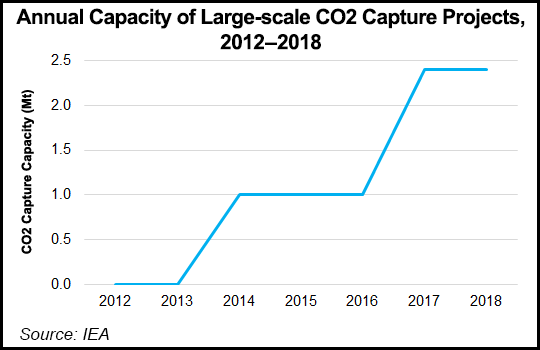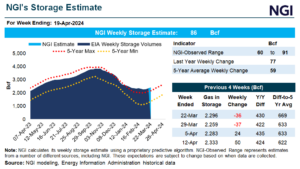Infrastructure | NGI All News Access | NGI The Weekly Gas Market Report
DOE Awards Carbon Capture, Storage Project Funding
The U.S. Department of Energy (DOE) has awarded $11.5 million in funding for 12 research projects as part of Phase One of the Advanced Research Projects Agency-Energy’s (ARPA-E) FLExible Carbon Capture and Storage (FLECCS) program.

To adapt to conditions in an environment with high variable renewable energy (VRE), FLECCS projects awarded funding are to develop carbon capture and storage (CCS) processes. CCS would allow technologies, such as natural gas power generators, to respond to VRE.
“The FLECCS projects will work to address critical carbon capture and storage needs in our nation’s power systems,” said ARPA-E director Lane Genatowski. “The FLECCS program is intended to enable the next generation of flexible, low-cost, and low-carbon electricity systems, and we are eager to work with these teams to innovate the grid of the future.”
The 12 teams are working to create CCS retrofits to existing power generators in addition to greenfield systems that produce fossil carbon-containing fuel, such as natural gas or biogas, then output electricity. The Phase One teams are to design, model, and optimize CCS processes that allow flexibility on a high-VRE grid.
Additional funding of up to $31 million is to be awarded to teams that move on to FLECCS Phase Two. In the second phase, teams would shift their focus to building components, unit operations and prototype systems in order to reduce technical risks and costs.
The Phase One projects awarded funds included:
- General Electric Global Research, which was awarded $717,658 to optimize an oxy-combustion natural gas-fired turbine for flexible generation on a grid with high-VRE penetration at near-zero carbon emissions;
- Linde Gas North America LLC was awarded $479,966 to develop a system for natural gas-fired power plants using post-combustion carbon capture and hydrogen technologies;
- Susteon Inc. received $789,009 to evaluate a carbon dioxide (CO2) capture technology to operate generators for power plants in a “load following” mode in response to grid conditions in a high-VRE environment;
- Luna Innovations Inc. was awarded $989,660 to develop FlueCO2, a process that allows traditional power generators to respond to increased VRE while reducing greenhouse gas emissions; and
- Envergex LLC received $1.9 million to develop and integrate a flexible, low-temperature CO2 capture system into a natural gas combined cycle power plant that would be capable of operating in a high-VRE environment.
© 2024 Natural Gas Intelligence. All rights reserved.
ISSN © 1532-1231 | ISSN © 2577-9877 | ISSN © 1532-1266 |


